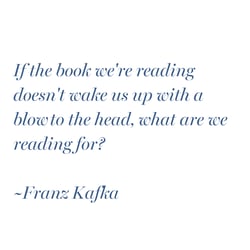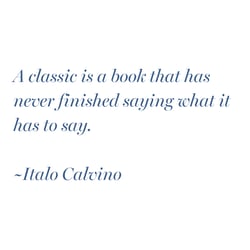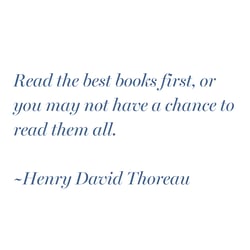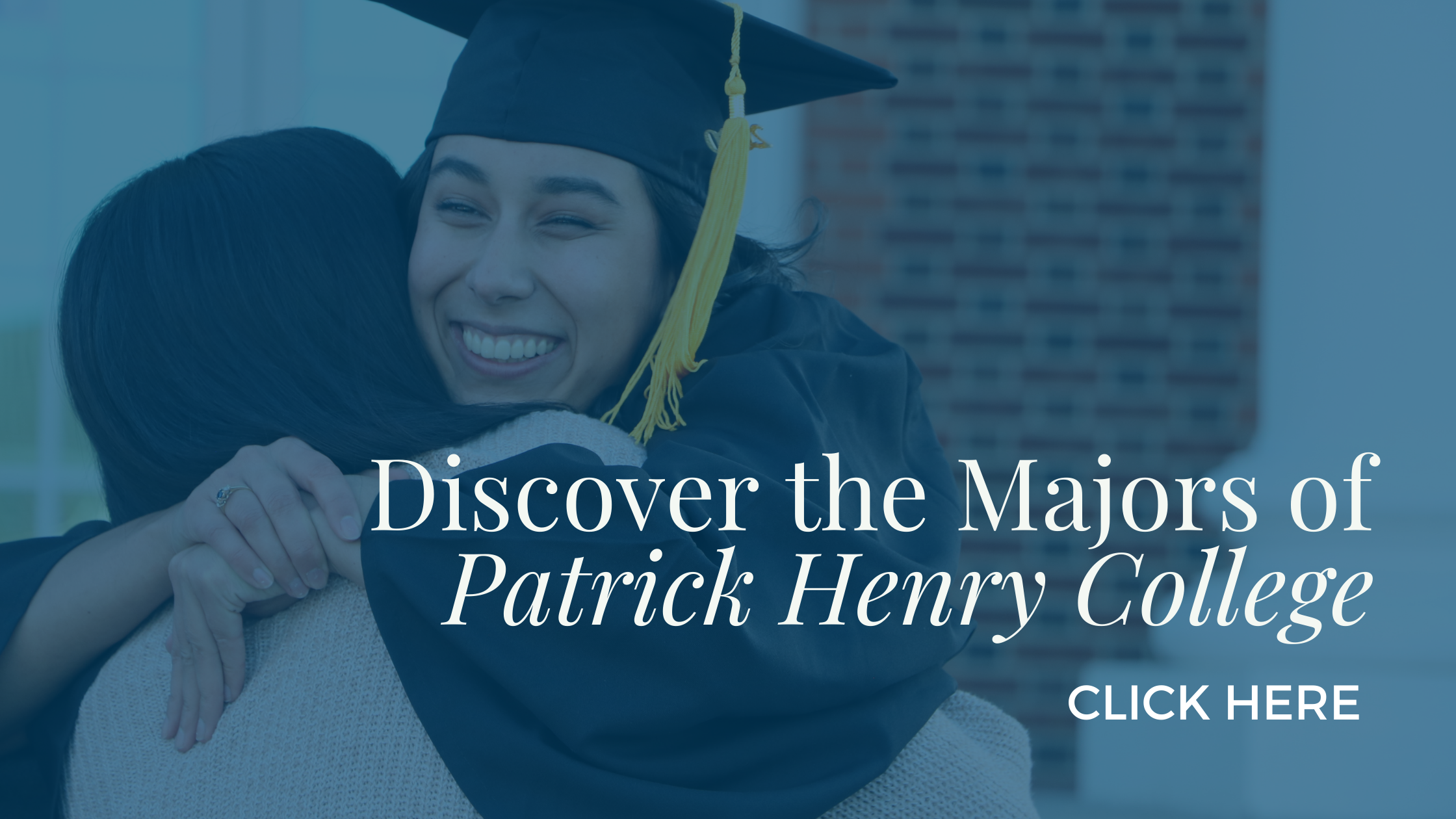.png?width=714&name=Essay%20The%20Deep%2c%20Deep%20Dive%20of%20reading%20(1).png)
Want to know why you should read the classics? Here’s some facts:
Reading can broaden your vocabulary (and boost those SAT scores), strengthen your emotional intelligence and social perception, improve your personal ethics, be a form of therapy, and of course, give you the invaluable ability to understand obscure literary references like “Big Brother” (1984), “Wife in the Attic” (Jane Eyre), or “Tilting at Windmills” (Don Quixote).
Still not convinced? Let’s talk for a moment about education.
Educated to Be Free
Patrick Henry College subscribes to the education model known as Classical Liberal Arts. Classical means a grounding in the great books and ideas that have been stood the test of years and exerted incredible influence on individuals, societies, and civilizations. Liberal means an education designed for people who value liberty and want to preserve it.
It takes a broad, holistic approach to education over a narrow focus. This breadth allows students to understand and meaningfully interact with revolutionary ideas and worldviews that have shaped society throughout history. Ultimately, to study the Classical Liberal Arts is to approach learning as a multifaceted soul seeking truth, beauty, and virtue.
PHC's philosophy of education states that "people who are free must be given an educational that equips them for freedom." Many of America's founding fathers expressed the idea that an educated and virtuous citizenry was the best preserver of freedom. John Adams, for instance, wrote, "Public virtue cannot exist in a nation without private virtue."
So what does this all have to do with reading books?
Reading the great books is itself a broad education. Reading can widen our outlook, upset our assumptions, and teach us about truth, beauty, and virtue. Exactly what a classical liberal arts education aims to do.
A Window to the Past, A Lens For the Present
 Reading allows you to understand the complexity of the past. We can never understand our own age if we do not understand the mentalities, the experiences, the wisdom, and the folly of previous ages. To understand the horrors of Nazism, read Anne Frank’s Diary of a Young Girl. To understand the evils of American slavery, read Frederick Douglass' gripping autobiography. To understand the spell of communism that resulted in the Cold War, start with Marx’s Communist Manifesto.
Reading allows you to understand the complexity of the past. We can never understand our own age if we do not understand the mentalities, the experiences, the wisdom, and the folly of previous ages. To understand the horrors of Nazism, read Anne Frank’s Diary of a Young Girl. To understand the evils of American slavery, read Frederick Douglass' gripping autobiography. To understand the spell of communism that resulted in the Cold War, start with Marx’s Communist Manifesto.
Author Italo Calvino wrote, “The classics are books that exert a peculiar influence, both when they refuse to be eradicated from the mind and when they conceal themselves in the folds of memory, camouflaging themselves as the collective or individual unconscious.” Their impact exerts acknowledged and unacknowledged influence on our society.
 Great books also have something to say about our own age. Their wisdom does not die with their generation. For a warning of the dangers of totalitarianism, read Orwell’s 1984. For insight into the dangers of legalism, read The Scarlet Letter. To better understand friendship, read Wind in the Willows. For the complexity of sacrifice, Ender’s Game. For the pervasiveness of sin, East of Eden. For the importance of steadfast virtue, Persuasion. For the indispensability of courage, The Iliad.
Great books also have something to say about our own age. Their wisdom does not die with their generation. For a warning of the dangers of totalitarianism, read Orwell’s 1984. For insight into the dangers of legalism, read The Scarlet Letter. To better understand friendship, read Wind in the Willows. For the complexity of sacrifice, Ender’s Game. For the pervasiveness of sin, East of Eden. For the importance of steadfast virtue, Persuasion. For the indispensability of courage, The Iliad.
Classical literature also allows us to better understand ourselves. That is why copious reading often leads to greater amounts of empathy—it enables us to better understand the universal aspects of the human experience instead of being always stuck in our own heads.
It may be startling to see our own dangerous thoughtlessness in Daisy from The Great Gatsby, our adolescent insecurity in Salinger’s Catcher in the Rye, or the mountain-to-valley journey of our spiritual lives in Bunyan’s Pilgrim’s Progress. Yet all of these books, and so many more, have rich messages for us to break down our self-absorption and deepen our perception.
Classical literature allows us to take a deep, deep dive into the lives, worldviews, and mindsets of people we’ve never met, visit the places we’ve never been, and understand the times we’ll never directly experience. Our forays into literature allow us to better understand the “signs of the times” what is happening in our world today and hazard guesses as to why.
Aleksandr Solzhenitsyn, who brought global attention to the evils of the Soviet Union’s Gulag system, wrote, “The only substitute for an experience we ourselves have never lived through is art, literature...Literature conveys irrefutable condensed experience...from generation to generation. Thus is becomes the living memory of a nation.”
What About Books I Dislike/Disagree With?
Of course, when you read a lot you eventually run into a book you will dislike or even violently despise. Even if everyone else seems to sing its praises, you just loathe it and can’t understand why it continues to make those required reading lists. So here’s some confessions from me: I hated Wuthering Heights, couldn’t stand Lord of the Flies, and I absolutely despised Gone With The Wind.
However, I don’t regret my time reading those books. I believe that, though they were dark, depressing, and full of characters with sloppy morality, they still had something to say—about the dangers of uncontrolled passions, the dire consequences of certain decisions, and the emptiness of a life solely focused on self. Reading those lessons through the vivid portrayal of fiction allows you to more fully internalize them before you make those mistakes yourselves.
In reading classic literature, you will also read books that espouse a worldview you believe wrong, dangerous, or just depressing. I didn’t exactly agree with Marx when I read Communist Manifesto and I don’t subscribe to Machiavelli’s ruthless ethics. But when we read Nietzsche, we can better understand moral existentialism.
When we read Darwin, we better understand the impact of the theory of evolution. When we read Lewis’ Abolition of Man, we understand modern man’s struggle with objective truth. Unless you understand where a worldview comes from and its key doctrines, you will never be able to respond to the concerns of those who believe it.
Ultimately, we don’t have to be afraid of interacting with an idea we believe to be false. God’s Word offers the standard by which all human ideologies are judged. It provides a higher revelation of truth than any that human philosophy could conjure up. However, rather than limiting or confining one’s education, this high revelation grounds the human mind in truth, and frees us to confidently explore all of learning.
Choose Wisely
 Lastly, one quick note lists like the "How Many of These 100 Great Books Have You Read?" list. The goal is not to suggest that every single book on the list is a must-read for every student. I haven’t read every book. Rather, lists like these are starting points for your dive into classical literature. Reading classical works will impact you and reward you for the time spent.
Lastly, one quick note lists like the "How Many of These 100 Great Books Have You Read?" list. The goal is not to suggest that every single book on the list is a must-read for every student. I haven’t read every book. Rather, lists like these are starting points for your dive into classical literature. Reading classical works will impact you and reward you for the time spent.
As Dr. Hake tells us in Western Literature II, there will always be books you simply won’t have time to read. Instead of stressing out and frantically seeking to check off every book on your bucket list, take time to enjoy and deeply interact with each book you do get a chance to read.
My last advice is this—read well and deeply. Choose wisely. And lastly, enjoy.




